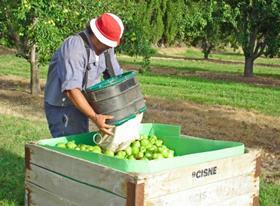
Argentina’s topfruit exports fell sharply in the first quarter of 2017 reflecting the deepening crisis engulfing the sector. According to the latest figures published by Senasa, exports from Alto Valle de Río Negro and Neuquén totalled 140,668 tonnes, 18.5 per cent less than in the year-earlier period.
Apple shipments were down 37 per cent to 16,547 tonnes, while pear volumes dropped 15 per cent to 124,122 tonnes.
The fall is largely due to the collapse of the Brazilian market because of strengthening competition from Chile. In the first three months of this year Brazil imported 1,600 tonnes of Argentine apples compared with almost 8,000 tonnes in Q1 2016.
Chile’s share of the Brazilian apple market increased from 36 per cent in 2014 to 72 per cent the following year. In that same period, Argentina’s share of the market fell from 43 per cent to 19 per cent.
In the case of pears, an increase in exports to Russia and Brazil was not enough to offset a fall in shipments to the US and Italy.
Years of underinvestment have led to a major loss in competitiveness and acreage has contracted by more than 20,000ha since 2000.
The government has been forced to declare a state of economic, productive, financial and social emergency in the provinces, sanctioning it to implement special powers relating to the payment of tax and social security.
Producers said an emergency US$540 injection announced recently by President Mauricio Macri would provide partial relief, but would not solve the sector’s deep-rooted problems.
They are calling on the government to do more to reduce taxes and labour costs and provide additional funds to upgrade orchards and packhouses and overhaul the region’s varietal offer.
The Federation of Fruit Producers estimates that it will cost between US$1.5 and US$2bn to reactivate the industry.



